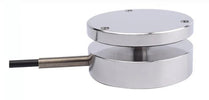
Ring Torsion Load Cell: Accurate & Durable Force Measurement
, by Alif Vasaya, 5 min reading time

, by Alif Vasaya, 5 min reading time
Discover the precision of ring torsion load cells for industrial, research, and testing applications. Reliable, durable, and resistant to side loads.
In industries where accuracy and durability define success, ring torsion load cells have become a trusted solution. These specialized sensors are designed to measure force through the torsional strain generated within a ring structure, providing high accuracy even under heavy loads. From industrial testing to material research, the ring torsion load cell combines robustness with precision, making it a valuable tool for engineers, manufacturers, and researchers.
A ring torsion load cell is a force measurement device that detects torsional strain within a ring-shaped body when a load is applied. Unlike traditional shear beam or compression load cells, the ring structure offers improved stability and reduced sensitivity to side loads or eccentric forces.
Key features include:
Compact and ring-shaped design
High resistance to off-center loading
Excellent repeatability and linearity
Suitable for both static and dynamic applications
Ring torsion load cells are widely used across industries where consistent and reliable force measurement is crucial.
Material Testing Machines – Ensuring accurate tensile and compression tests.
Industrial Automation – Used in assembly lines and robotic systems for force control.
Aerospace & Automotive – For fatigue testing and high-precision structural measurements.
Research & Development – Ideal for laboratory testing where exact measurements are required.
Heavy Machinery – Load monitoring in presses, rolling mills, and other industrial equipment.
High Accuracy – Precision measurement, even in high-capacity ranges.
Robust Construction – Designed to handle harsh industrial environments.
Minimal Sensitivity to Side Loads – Reduces measurement errors.
Versatility – Works for both dynamic and static force measurement.
Durability – Long service life with low maintenance requirements.
When selecting a ring torsion load cell, engineers should look at:
Capacity range – from a few hundred kilograms to several tons.
Material – stainless steel construction for durability.
Sealing protection – IP67 or IP68 for use in harsh conditions.
Signal output – standard mV/V with compatibility for amplifiers and indicators.
For reference, check NIST Load Cell Standards for calibration and performance guidelines.
Q1. What makes a ring torsion load cell different from a compression load cell?
Ring torsion load cells measure torsional strain within a ring structure, while compression load cells measure axial strain. This makes ring torsion models more stable under side loads.
Q2. Can ring torsion load cells be used in dynamic applications?
Yes, they are designed for both static and dynamic force measurement, ideal for testing machines and robotic systems.
Q3. Are these load cells suitable for harsh environments?
With stainless steel construction and IP-rated sealing, ring torsion load cells perform well in industrial and outdoor conditions.
The ring torsion load cell is a versatile and precise solution for industries that demand consistent force measurement. Its unique design ensures durability, accuracy, and resistance to external influences, making it ideal for applications in research, testing, and industrial automation.
For engineers and buyers seeking reliable force measurement tools, explore our full range of load cells or get in touch via our contact page to find the best solution for your project.